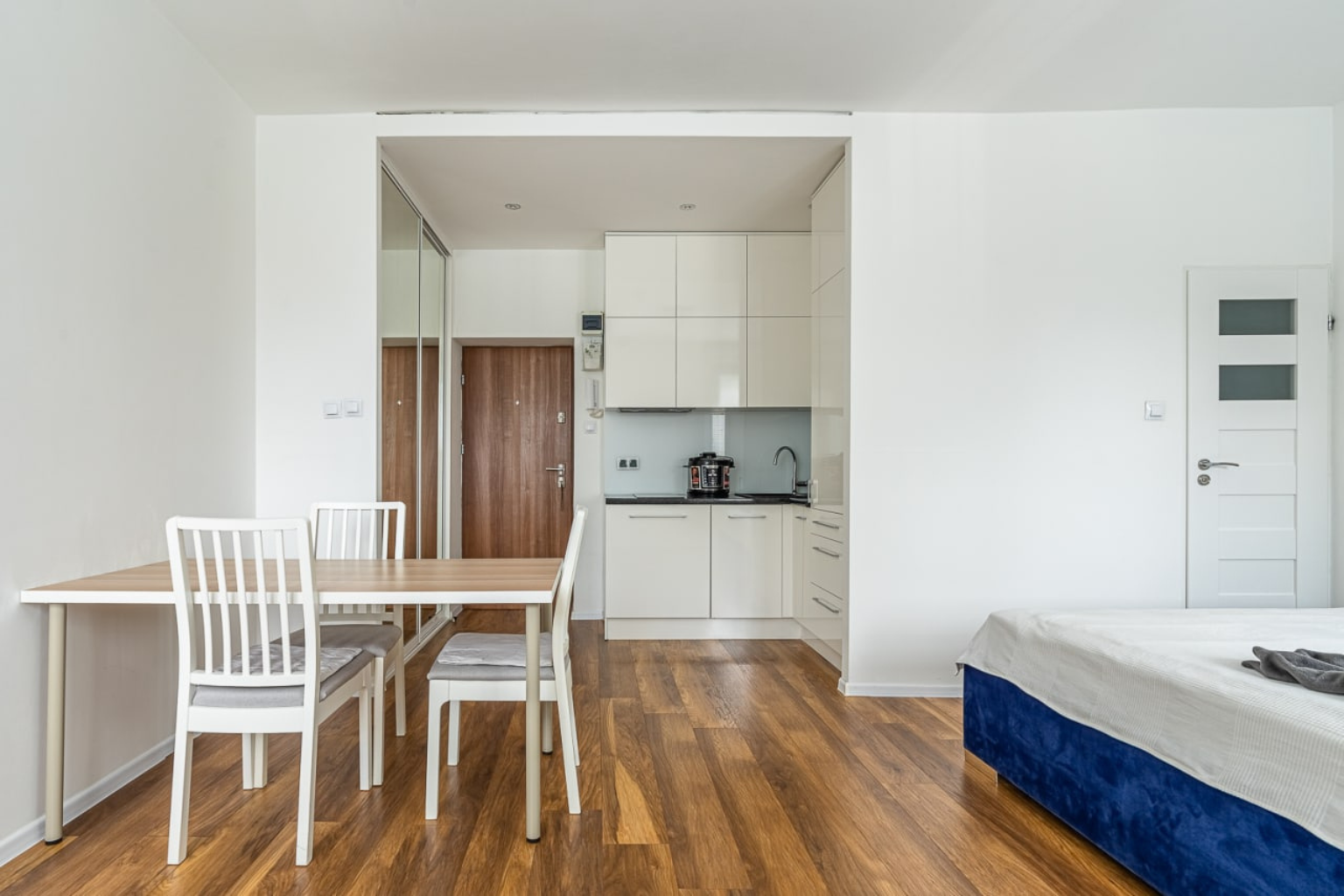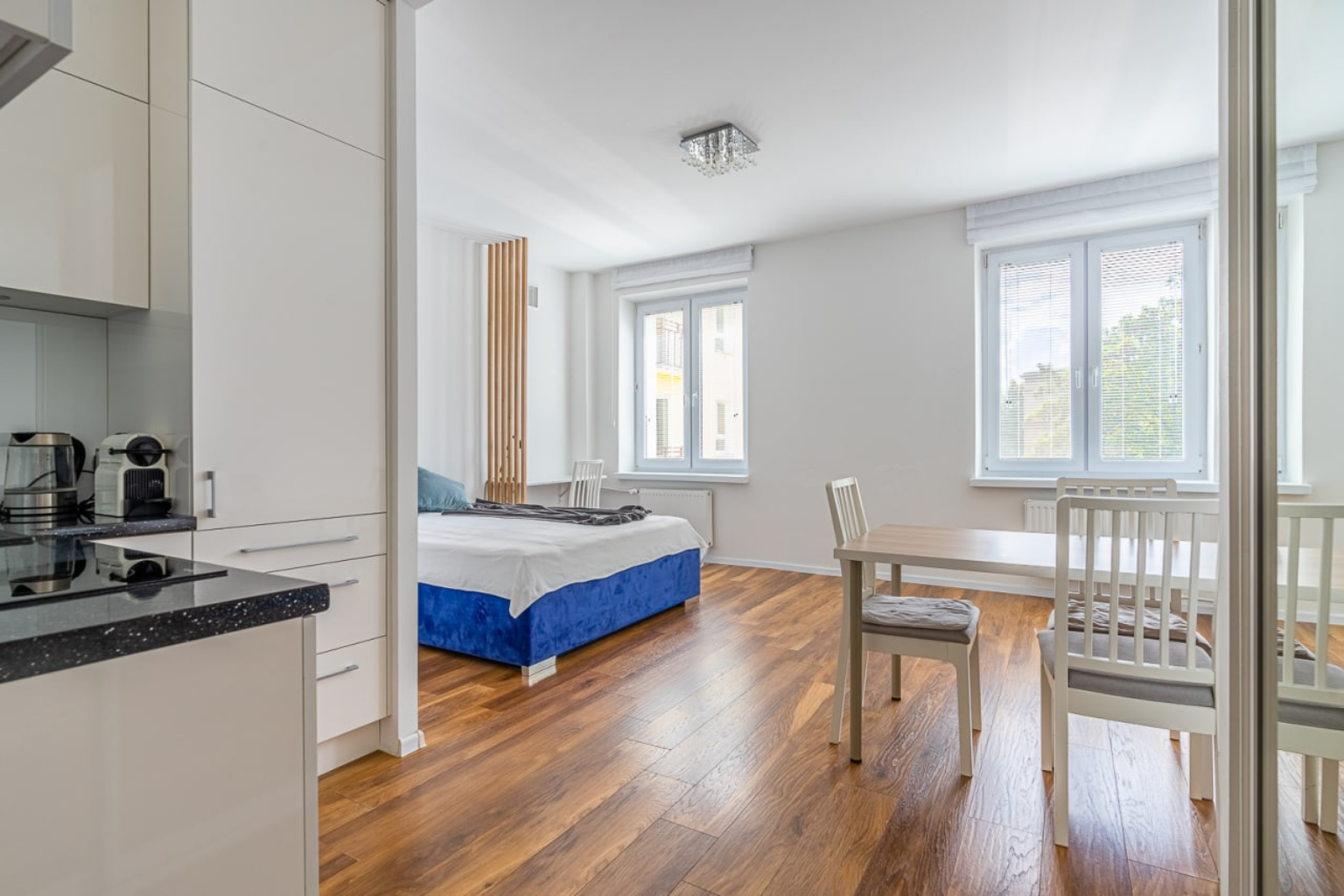
«There was a woman with seven cats and an apartment where you can’t open a brothel». The «horrors» of renting in Warsaw from a realtor
Renting an apartment in Warsaw is now a quest that not everyone can pass without help. The cost of housing is off-scale, the most favorable options are «gone» literally an hour and a half after the ad publication, and the owners require tenants to almost dance around with tambourines. What to do in this situation? And is the landlord really the problem? About all this and more we talked with realtor Margarita Jasiewicz, who actively works in the real estate market in Warsaw and knows about all the possible difficulties that not only landlords but also tenants can face.
«There was a case where tenants paid a year in advance»
Margarita has lived in Warsaw for more than 10 years and has been active in the rental market. During this time in her practice, there have been a variety of «cases». The realtor told about the most interesting in an interview with a journalist on Realting.com.
 — How is the rental market in Poland and particularly in Warsaw now?
— How is the rental market in Poland and particularly in Warsaw now?
— The situation in the real estate market in Warsaw continues to be quite tense: demand is only growing, but the number of proposals from month to month is falling. Poland is literally experiencing a «boom» in immigration — the number of foreigners with residence permits in the country in 2022 has tripled. Many of those who came, seeing the cost of renting, prefer immediately to buy their own homes.
The tension in the market is also caused by the fact that fewer and fewer people can take out a mortgage to buy their own homes because interest rates on loans are incredibly high. Many buyers took a wait-and-see attitude, hoping for lower interest rates. There is a chance that in the summer there will be a law to help people buy their first home in Poland — in this case, the interest on the mortgage will be 2%, and not only foreigners but also local residents are waiting for this.
All these processes, of course, are reflected in the rental market — the cost of rental housing in the Polish capital in 2022, according to my observations, has increased by 1.5-2 times. At the same time, the spread of rental prices is very large and depends on the situation and the luck of tenants. On average, you can rent a one-bedroom apartment in Warsaw for 3,500 PLN, and a two-bedroom apartment for 4,500 PLN. A small studio apartment for rent costs on average 2,800 PLN. I deliberately did not indicate the upper price limit, because now it simply does not exist — there are cases when «two-bedrooms» in neighborhoods around the center were rented for 8,000 to 12,000 PLN (and that’s not an offer, but the amount of the real deal).
— What features of the Warsaw rental market could you name?
— As I said before, the rental market in Warsaw is now literally «boiling» because of the high demand. In such circumstances, it is difficult to talk about any specifics — the situation is determined by the speed of decision-making and the ability to adapt (and this applies to both tenants and landlords).
Here is a big demand for small apartments (this applies to both renting and buying). Housing with a total area of 80-90 square meters in Poland is often considered illiquid. Finding a three-room apartment with 46 square meters is common, and it will be popular with both tenants and buyers. I think this is due to living conditions, less number of large families, and the general way of life. By the way, I’ve lived here for over 10 years, and I don’t know a single family with many children. There are a lot of «childfree» people in my circle. If they even think about children, it’s from the position «maybe someday, but first, we’ll get a dog».
This mindset greatly affects the attitude toward housing: if a person is currently single or it may be a young couple without children, then the request will be to find a one-bedroom apartment or a «kavalerka». Here no one thinks in advance about the family growth and very rarely rents/buys a house «with reserve». By the way, «kavalerka» is one of the peculiarities of the real estate market in Warsaw. They are such very small apartments with an area of 19 sq.m. and more. As a rule, they appear by dividing a large four- or three-bedroom apartment into several small apartments. In each «kavalerka» apartment there is a small corner for the bathroom and the rest of the space is a studio apartment with kitchen equipment in the corner. And such «kavalerka» apartments are in great demand among tenants, and they are not cheap — on the outskirts of the capital in the Ursus area not so long ago, an apartment of 19 square meters was rented for 1,900 PLN (about $450).
I’m not sure if this can be defined as a feature, but now almost no one wants to rent an apartment for less than six months. In addition, a feature of the 2022 rental market has become the presence of casting among tenants, and it appears that this will soon become the norm for everyone.
— How do auditions for rentals take place? How do you know which tenant will be chosen?
— The demand for apartments for rent in Warsaw is very high, and it is not only for Belarusians and Ukrainians. In my practice, I have had clients, for example from Sweden, who decided to open their own business in Warsaw because of the lower taxes here. On top of that, locals also actively use rentals — some move to the capital from smaller towns, and some simply move out from their parents/husband or wife.
As a result, the owners of apartments (especially low-cost ones) have someone to choose from, and real castings are arranged. All potential tenants are assigned one date and time for «viewing», and at the appointed time all those who wish to do so line up in front of the apartment. Then everyone enters the apartment and tells about themselves: what is their income level, where they work, what documents they have, and for how long they are ready to rent an apartment. There are no common selection criteria here — it all depends on the owner of the apartment. If, for example, two girls-students, a family with a child, two IT guys, or a young couple came to the casting, it is more likely that the two IT guys or a family with a child (if the child is over 5 years) will have priority. But there are no clear criteria here — it all depends on the situation, income stability, and language skills.
Some candidates are willing to pay six months’ rent in advance as an argument, and this, of course, is a weighty argument for the owner. I had a case with an apartment in Wilanów, where the tenants didn’t want to participate in any castings and simply paid a year in advance. It was an interesting situation, because they paid in cash in PLN (the owner refused to pay in foreign currency), and we had to count the money for about an hour. Thanks to this payment I also managed to negotiate a good discount. In the end, it cost 9,900 PLN per month (about $2000) to rent this two-bedroom apartment with a garage.
There were also cases when the owners were afraid to accept such payment conditions, doubting the source of «such» money. With experience comes an understanding of the psychology of the owners and on an intuitive level choosing a strategy of interaction, which later will help to agree on mutually beneficial terms.

«Inability to evict is not the only problem of owners»
— What are the pitfalls of the rental market to be aware of now?
— The pitfalls of renting are in fact very numerous, and not all of them concern tenants — apartment owners are often at risk as well. For example, I know a case where the owner of an apartment did not conclude an occasional rental agreement with tenants and then was unable to evict them for two years (Note. An occasional rental agreement is a type of rental agreement, its main feature is that another property is specified, where the tenant can move out in case of non-compliance with the terms of the lease).
The tenants did not pay because they «did not have the money for it» and did not move out because, in their words, «there was nowhere to go». And the owner of the apartment in this case was trapped: according to the law, if a person says that he has nowhere to live and he has not registered anywhere, it is impossible to evict him from the apartment. More precisely, this process takes a great deal of time and effort and goes through the courts. Now the consideration of such cases in court can take up to two years, and all this time the landlord will not receive any money for his own property and will not be able to do anything with this property.
But the inability to evict is not the only problem with tenants, it’s just the tip of the iceberg. I know a case where tenants moved into a newly renovated house and literally «destroyed» it within a few years. At the same time, when the owner explained that he would not give them the deposit for the house and it would be nice to repair everything they ruined, the tenants immediately countered by saying that «the house was exactly like that». Of course, the owner of the house went to court with this case, but it is likely to be a futile case because in the protocol there was not a detailed description of the house’s condition and all its smallest details. Now to prove that, for example, the countertop in the kitchen was new and without deep scratches, is impossible. Or how to prove that there were no deep dents on the walls, or that the oven inside was not full of soot from burnt food? In the photos, which were provided by the owner, it is not visible — he did not photograph every inch of the house. In the end, the owner’s damages were estimated at 60,000 zlotys (about $13,500), and no one will pay them back to him.
And despite the common misconception, as a rule, such situations occur with Polish tenants, and not foreigners. Because Poles know the laws of their country well, they do not doubt that the state will protect them, and they feel much more confident than foreigners. Polish law in this matter is so flexible and not fully thought out, that some of its points can be interpreted in their own way, if you want. And this is the main reason why Poles-owners are so afraid to rent out their apartments.
— After these situations, you really don’t want to deal with tenants. But is there any way to protect yourself from this?
— The first is to work with trusted realtors. There are so many real estate agents on the rental market now, who in their spare time call the listings or just come to open the door with a key — that’s where their work ends. And that’s another problem that’s dangerous for tenants and landlords alike. And the cost of such «agent» services is from 500 PLN to 123% of the rent price.
Above I’ve already said about the contract of occasional rent — even if it’s not a guarantee of success of the owner of the apartment, at least it protects from non-payers. And the contract must be notarized and properly executed, which is also often neglected by landlords.
Regarding damage compensation — here it is important to specify the condition of all key elements of the apartment in the appendix to the rental agreement. For this purpose, there is a special scale from 1 to 6, where «1» is very bad condition, and «6» is new. Most often the owners prescribe that the condition of furniture and appliances is somewhere around «4-5», but if the tenant is the first to move into a newly renovated apartment, the owner has the right to put «6» in each item. If this is indicated, the tenant will have to pay for the repair of all damaged appliances or furniture (taking into account natural wear and tear) when they move out.
It is common practice in Poland for management companies to have an outside company oversee their rental property. Landlords often can not or do not want to spend time looking for tenants, controlling payments and paperwork — then there are representatives who for a fee take over the entire procedure. This is not a guarantee of security, but it will save the apartment owner’s nerves. I recommend renting an apartment from such firms — they are engaged in technical support if necessary, and also communicate with the tenants when it is necessary, and the owner is far away.
— What are the most unusual cases in your practice?
— The tenant is a woman with 7 cats. At first, I thought it was just a person who made a mistake in the application and accidentally indicated the wrong number of animals. But no, she really has 7 cats. I ended up refusing to work with this tenant.
Earlier this year I accommodated a family from Belarus — the guys had just recently moved to Warsaw. The difficulty was that they have a cat and a dog, and they wanted to rent a stylish nice apartment. There were not many willing landlords, to put it mildly, but thanks to experience I managed to find a «dream apartment» for them. I advise those who have pets to offer the landlord property insurance (around 75-100 PLN per year) or to increase the deposit (if you are really sure about your pets’ behavior). Plus, the contract, of course, will state that any damage from an animal will be taken care of by the tenants.



Another interesting thing: there were apartments where there was simply no Internet and network — like a «black hole» of some kind. In Warsaw, there are such new houses on Kłobuckiej Street, where the whole entrance hall simply has no network, and what to do about it — at the moment, it’s not clear.
Another unusual case: the owner of the apartment had written a separate clause in the lease agreement stating that no intimate services could be provided in this apartment. The interior of the apartment was really conducive to such attitudes — it was, let’s say, «glamorous». And, when the girl was renting this apartment, the owner several more times clarified whether the tenant understood this point and whether she agreed to it. Apparently, there were already some interesting cases in this apartment.
Just recently there was a situation with a large family from Ukraine that was relocating from Thailand to Poland. I found an apartment for them, being in constant online contact for 2 weeks. I organized everything in detail — notary, translator, airport transfer and even cleaning the apartment for a specific day and time. Just a couple hours before the flight from Phuket, the owner of the rental apartment said she changed her mind about renting the place and blew the deal. Fortunately, within a few days, we found an even better option. But it was a real nerve-racking experience. The lesson — the rental market is not stable, you need to be prepared for anything and keep your hand on the pulse if the contract is not signed.
A family from Ukraine came with a similar situation. They rented an apartment through an unscrupulous realtor who did not warn them that according to the contract, the landlord has the right to terminate the contract with only 7 days notice, and the tenant in his turn with one month’s notice. After 2 months of rent, the owner of the apartment came with the news that she was getting divorced and a week later the family had to move out. The lesson — check the terms of the contract carefully, so as not to get into a situation disadvantageous to you.
But in general, when you work in the real estate market nothing surprises you anymore, and it becomes clear why the apartment owners are so picky in their choice of tenants and require so much from them.


























